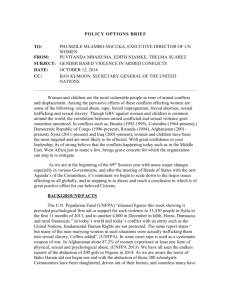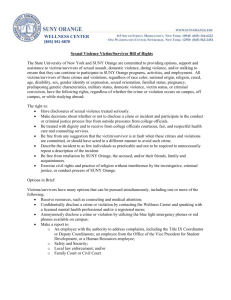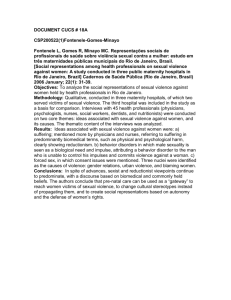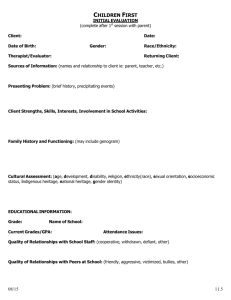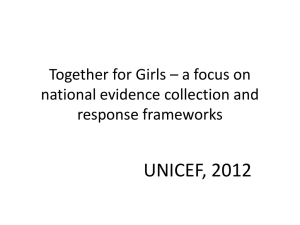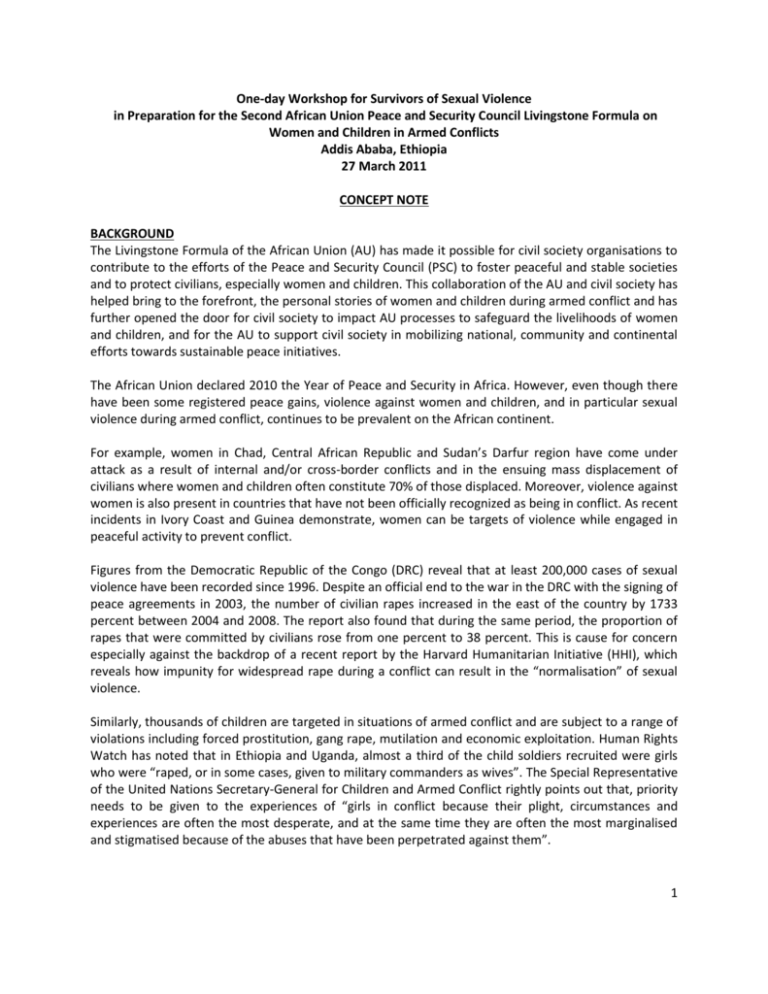
One-day Workshop for Survivors of Sexual Violence
in Preparation for the Second African Union Peace and Security Council Livingstone Formula on
Women and Children in Armed Conflicts
Addis Ababa, Ethiopia
27 March 2011
CONCEPT NOTE
BACKGROUND
The Livingstone Formula of the African Union (AU) has made it possible for civil society organisations to
contribute to the efforts of the Peace and Security Council (PSC) to foster peaceful and stable societies
and to protect civilians, especially women and children. This collaboration of the AU and civil society has
helped bring to the forefront, the personal stories of women and children during armed conflict and has
further opened the door for civil society to impact AU processes to safeguard the livelihoods of women
and children, and for the AU to support civil society in mobilizing national, community and continental
efforts towards sustainable peace initiatives.
The African Union declared 2010 the Year of Peace and Security in Africa. However, even though there
have been some registered peace gains, violence against women and children, and in particular sexual
violence during armed conflict, continues to be prevalent on the African continent.
For example, women in Chad, Central African Republic and Sudan’s Darfur region have come under
attack as a result of internal and/or cross-border conflicts and in the ensuing mass displacement of
civilians where women and children often constitute 70% of those displaced. Moreover, violence against
women is also present in countries that have not been officially recognized as being in conflict. As recent
incidents in Ivory Coast and Guinea demonstrate, women can be targets of violence while engaged in
peaceful activity to prevent conflict.
Figures from the Democratic Republic of the Congo (DRC) reveal that at least 200,000 cases of sexual
violence have been recorded since 1996. Despite an official end to the war in the DRC with the signing of
peace agreements in 2003, the number of civilian rapes increased in the east of the country by 1733
percent between 2004 and 2008. The report also found that during the same period, the proportion of
rapes that were committed by civilians rose from one percent to 38 percent. This is cause for concern
especially against the backdrop of a recent report by the Harvard Humanitarian Initiative (HHI), which
reveals how impunity for widespread rape during a conflict can result in the “normalisation” of sexual
violence.
Similarly, thousands of children are targeted in situations of armed conflict and are subject to a range of
violations including forced prostitution, gang rape, mutilation and economic exploitation. Human Rights
Watch has noted that in Ethiopia and Uganda, almost a third of the child soldiers recruited were girls
who were “raped, or in some cases, given to military commanders as wives”. The Special Representative
of the United Nations Secretary-General for Children and Armed Conflict rightly points out that, priority
needs to be given to the experiences of “girls in conflict because their plight, circumstances and
experiences are often the most desperate, and at the same time they are often the most marginalised
and stigmatised because of the abuses that have been perpetrated against them”.
1
The African Union and its Member States have established their firm commitment to address issues
related to “women and children in armed conflicts”. The Protocol to the African Charter on Human and
Peoples’ Rights on the Rights of Women in Africa (Maputo Protocol), the Solemn Declaration on Gender
Equality in Africa (SDGEA) and the African Charter on the Rights and Welfare of the Child condemn the
recruitment of children by armed actors and abuse of women and girls as wives and sex slaves, as it is in
violation of their fundamental rights and therefore prohibited. The African Union also emphasises the
responsibility of all States to put an end to impunity and to prosecute those responsible for genocide,
crimes against humanity, and war crimes including those relating to sexual and other violence against
women and girls. Moreover, the rights of women and children are protected in international human
rights and humanitarian law instruments.
Overall, the implementation of these instruments on the continent by the Commission of the African
and Member States, to safeguard human rights and child welfare, remains fragmented. Moreover, a
tangible change in the status of the majority of African women and children, especially in situations of
conflict, is yet to be seen…
JUSTIFICATION
Through its initiative launched at the end of 2009, the Panel of the Wise of the African Union is
determined to reaffirm its commitment to contribute to efforts to alleviate the plight of women and
children in armed conflicts. With the mandate to support the efforts of the Chairperson of the
Commission and those of the PSC, particularly on conflict prevention, the Panel is also called to
periodically draw the public’s attention to issues that do not receive sufficient attention through
different themes. Last year, the Panel stressed the need to initiate a thematic reflection on “Women and
Children in Armed Conflicts”, and to look for ways of enhancing Africa’s capacity to deal with these
challenges, which will contribute in advancing peace and security in Africa. FAS and the International
Peace Institute (IPI) have partnered with the Panel to organize the workshop and FAS was invited
together with UN Women, United Nation Children Fund (UNICEF), United Nations High Commissioner
for Refugees (UNHCR) and International Committee of the Red Cross( ICRC) to attend the first AU PSC
open session on Women and Children in Africa in March 2010 in Addis Ababa. Subsequently, FAS
partnered with the Panel and organize a workshop in May 2010 in Kinshasa to discuss the first Draft of
the Study on Women, Children and Conflict in Africa.
In view of the above, Femmes Africa Solidarité (FAS) will partner with the AU Panel of the Wise in
collaboration with UN Women and Civil Society Organizations such as ISIS-WICCE, ACCORD, Urgent
Action Fund and Oxfam among others to organize a one-day preparatory meeting on 27 March 2011 in
Addis Ababa for women survivors of sexual violence. This preparatory meeting will help prepare women
survivors of sexual violence to produce a statement and to deliver their testimonies during the 28 March
2011 Livingstone Formula. The women will be selected from DRC, Sudan, Uganda, Guinea, Zimbabwe,
Kenya and Cote d"Ivoire. Given the stigma surrounding rape in many African cultures, which often
impedes women from disclosing or discussing their experiences with sexual violence, the workshop aims
to help break the taboo around discussions related to sexual violence. It is important that women are
not seen as passive victims, which overlooks the multiple roles women play in conflict, but also as
survivors and promoters of peace.
2
Overall Objective
To prompt and urge the Peace and Security Council and the AU Commission towards a holistic approach
in the implementation of existing commitments and policies addressing issues related to women and
children in armed conflicts. This will allow for consolidation of the efforts of the AU Commission and the
Peace and Security Council in addressing issues related to women and children in armed conflicts (i.e.
sexual violence, other forms of sexual exploitation, use of child soldiers, etc).
Specific Objectives
1. To assist women that have been subjected to sexual violence in context of conflicts to regularly
and effectively testify during the AU Peace and Security Council.
2. To recommend ways to accelerate the implementation of existing commitments made by Heads
of State and Government and various stakeholders in eliminating, politically and substantially,
all forms of violence against civilians, particularly women, girls and boys in armed conflict
situations.
3. To identify quick-impact sustainable actions/projects that can further the implementation of all
relevant AU and UN Resolutions regarding violence against women and children in armed
conflict.
4. To call for action in the psychological, social and economic rehabilitation of survivors
Activities
1. One-day training workshop for ten women survivors of sexual violence to produce a statement
consolidating their views and recommendations to the AU Peace and Security Council on the
interventions regarding prevention of sexual violence and the rehabilitation of survivors.
2. Prepare two to three representatives of women survivors of sexual violence to testify during the
Second AU Peace and Security Council Livingstone Formula on Women and Children in Armed
Conflict scheduled for 28 March 2011.
Expected Outputs
1. A statement to the AU Peace and Security Council consolidating the views and
recommendations of women survivors regarding the prevention of sexual violence and the
rehabilitation of survivors.
2. A clear road map on how to involve women survivors of sexual violence in shaping the outcome
of the Second Livingstone Formula on women and children in armed conflict in Africa.
3




